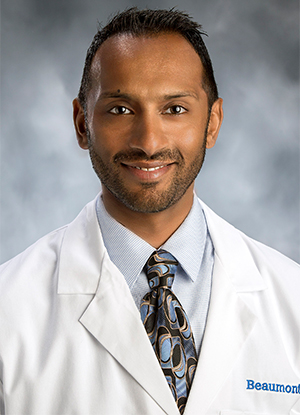
An Oakland University William Beaumont School of Medicine professor and Beaumont Health radiation oncologist has been awarded a $1.6 million grant to study an aggressive brain cancer.
Prakash Chinnaiyan, M.D., an expert in the treatment of brain and spine cancer, has been awarded the five-year grant from the National Institutes of Health.
Chinnaiyan, who is a professor in the Department of Radiation Oncology, will study metabolic reprogramming in glioblastoma.
“Cancer cells require specific nutrients to thrive and grow,” said Chinnaiyan. “The goal of our research is to identify what nutrients glioblastoma cells need to live, understand why they utilize these nutrients and determine if these metabolic pathways can be disrupted. This understanding can lead to new treatments.”
According to the Mayo Clinic, “glioblastoma is an aggressive type of cancer that can occur in the brain or spinal cord. Glioblastoma forms from cells called astrocytes that support nerve cells.”
Mayo Clinic says glioblastoma can occur at any age, but tends to occur more often in older adults. It can cause worsening headaches, nausea, vomiting and seizures.
Further, Mayo Clinic says glioblastoma, also known as glioblastoma multiforme, “can be very difficult to treat and a cure is often not possible. Treatments may slow progression of the cancer and reduce signs and symptoms.”
Chinnaiyan says the median survival rate is less than two years with limited treatment options. The standard of care includes surgery to remove as much of the tumor as is possible, followed by radiation and chemotherapy. It is uncommon for most diagnosed with glioblastoma to live longer than five years. Each year about 15,000 Americans die from glioblastoma.
Based on a decade of work, Chinnaiyan’s lab-based study will take place at the Beaumont Research Institute in Royal Oak.
The grant is the second one Chinnaiyan has received from NIH to study glioblastoma. He also has received funding from the Department of Defense and the American Cancer Society.
“The (new) NIH funding will allow our research team to continue this promising work for the next five years,” said Chinnaiyan. “We are hopeful our findings will lead to new treatments for patients diagnosed with glioblastoma.”
For more information, contact Andrew Dietderich, marketing writer, OUWB, at [email protected].

